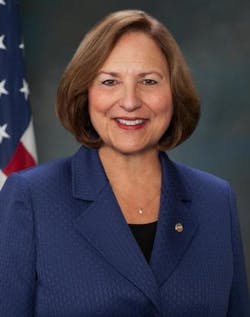Making good on a promise from earlier this year, a senator with a key committee leadership position has filed a bill aimed at reining in the agency that regulates trucking.
Sen. Deb Fischer (R-NE) has introduced S. 1669, “a bill to reform the Federal Motor Carrier Safety Administration.” The legislation was referred to the Commerce committee, for which Fischer chairs the subcommittee on surface transportation.
As of this post, the details of the bill filed Wednesday have yet to be published. In a March hearing, Fischer cited reports from independent agencies that were critical of the agency as the basis for her plan to “ensure that the [regulatory] process is more inclusive of Congress and stakeholders.”
“I share the FMCSA’s commitment to increasing the safety of our nation’s roads. We must never lose sight of this goal,” Fischer said in a hearing focused on the trucking regulatory agency. “Some of the FMCSA’s actions over the past several years, however, challenge our shared goal of enhancing safety.”
She made special note of problems with the Compliance, Safety, Accountability (CSA) program as well as the 2013 hours of service (HOS) rule.
The reform legislation would focus on a complete review of FMCSA’s current guidance, and establish a regulatory framework which must include “a more robust cost-benefit analysis” that represents carriers from a wide variety of business models and, when necessary, the agency should also conduct "a real-world study” of the proposed regulation, she explained at the time.
According to a section-by-section outline, Fischer’s bill would require FMCSA to conduct a comprehensive review of all rules, regulations, regulatory guidance, and enforcement policies every five years.
Among other requirements cited in the analysis:
- When evaluating regulations and enforcement policies, FMCSA must specify how it plans to evaluate future rules to measure their intended outcomes;
- For future regulations, FMCSA must provide a wider scope and selection of motor carriers in its cost-benefit analysis, including truck and bus carriers of all sizes, operation types, and sectors. FMCSA cost-benefit analysis shall be subject to independent peer review by a balanced panel of experts; and
- FMCSA shall prioritize stakeholder petitions based on the likelihood of safety improvements and respond to petitions no later than six months after a petition is submitted, and the agency must maintain a publicly available inventory of all petitions received, including information about the disposition of each position.
“Though the burden of FMCSA’s mission is immense, Congress must reform the agency to ensure higher levels of trust, collaboration, and, ultimately, more effective regulations to keep our nation’s roads safe,” Fischer said in March.
In April, Fischer questioned why the agency released an app designed to provide streamlined mobile-device access to CSA data on trucking companies.
“I have serious concerns about FMCSA's release of the app and the agency's decision to use resources to enhance public access to inaccurate data,” Fischer wrote in a letter to Transportation Secretary Anthony Foxx.
And in May, Fischer and Roy Blunt (R-MO) introduced S. 1454, a bill that would create a national hiring standard for motor carriers to address the confusion in the marketplace over CSA carrier scores.
Also Wednesday, Fischer introduced S. 1672, “a bill to authorize States to enter into interstate compacts regarding Class A commercial driver's licenses." The bill opens the door for states to agree to allow drivers under the age of 21 to cross state lines.
American Trucking Assns. sees the bill as one that will create job opportunities and address the driver shortage.
“In each of the continental United States, a person can get a commercial driver’s license and drive a truck at the age of 18, but federal law prevents them from driving across state lines until they reach the age of 21,” said ATA President and CEO Bill Graves. “It is illogical that a 20-year-old can drive the 500 miles from San Francisco to San Diego, but not the eight miles from Memphis, Tennessee to West Memphis, Arkansas—or simply cross the street in Texarkana. Even more illogical is that a 20-year-old may not drive a truck in any state if the cargo in it originated outside the state or will eventually leave the state by some other means.”
The legislation comes as FMCSA is weighing the input of its Entry-Level Driver Training Advisory Committee, which was formed to develop basic training standards for truck drivers and has just released its “consensus recommendation” for a rulemaking. FMCSA also has recently announced plans to standardize recordkeeping and reporting protocols for state CDL programs.
About the Author
Kevin Jones 1
Editor
Kevin has served as editor-in-chief of Trailer/Body Builders magazine since 2017—just the third editor in the magazine’s 60 years. He is also editorial director for Endeavor Business Media’s Commercial Vehicle group, which includes FleetOwner, Bulk Transporter, Refrigerated Transporter, American Trucker, and Fleet Maintenance magazines and websites.

